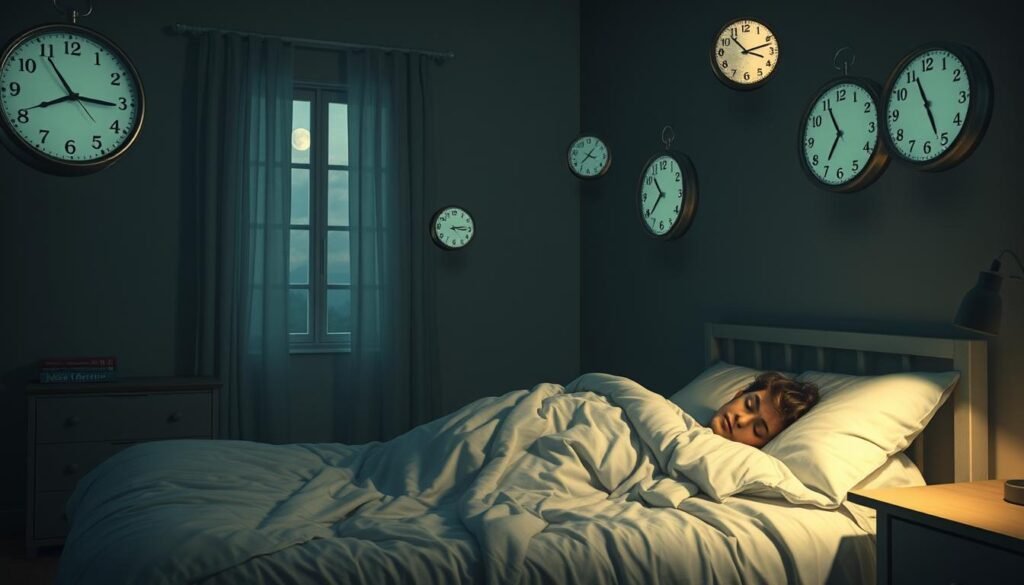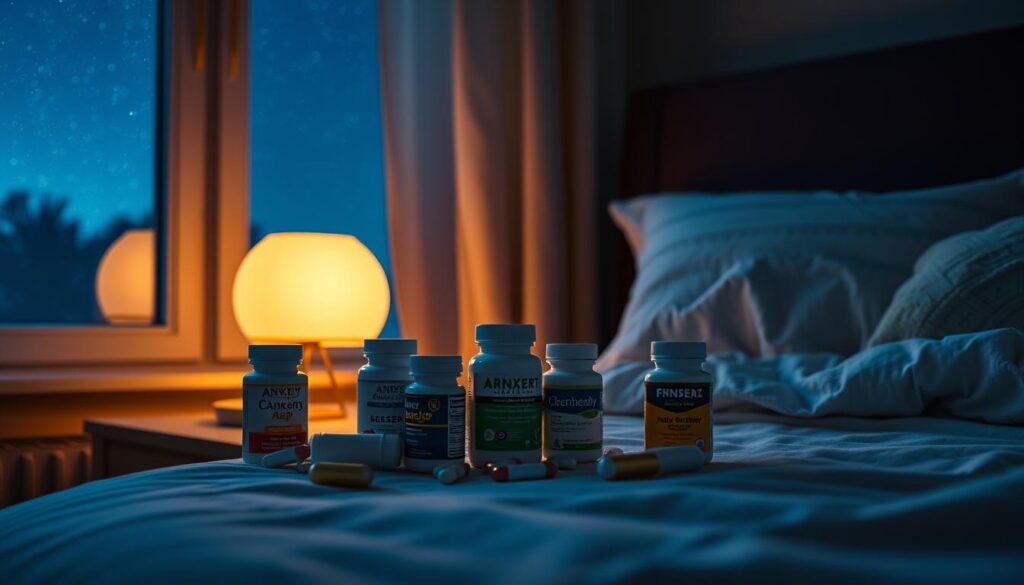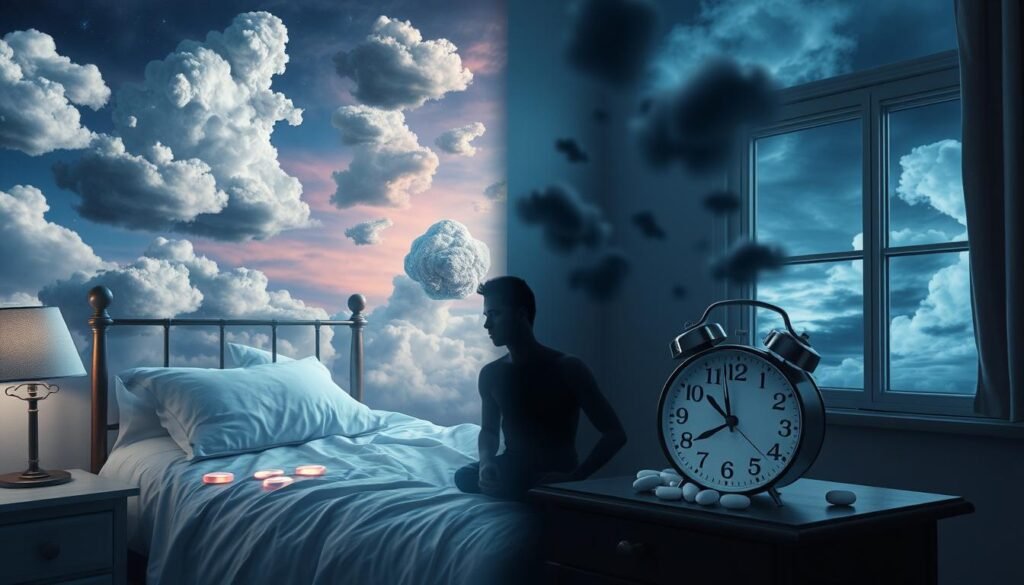Did you know about one in three adults go through insomnia at some point? This shows a big need for anxiety sleep medications that work well. Many people fight anxiety and sleep issues constantly. This battle affects their health and how they do every day. In this article, we look closely at different ways to solve this common problem. There are prescription drugs and over-the-counter options that can really help improve sleep and lessen anxiety. We will also check out lifestyle changes and non-medical methods to get better sleep.
It’s key to understand how anxiety affects sleep for those dealing with these issues. Keep reading to find the top meds for people dealing with insomnia and anxiety. These can truly lead to better rest and improve your life.
Key Takeaways
- Over one-third of adults experience insomnia at times.
- Prescription anxiety meds help with sleep problems.
- Non-drug approaches also aid in better sleep.
- It’s important to know sleep meds’ side effects.
- Changing your lifestyle can boost meds’ effects.
Understanding Anxiety and Sleep Disorders
In the US, anxiety and sleep disorders are big health issues, touching millions of lives. Around 20% of adults struggle with a mental illness, with anxiety disorders being very common. These disorders cause a lot of worry and tension, making daily activities hard.
Insomnia means you have trouble falling or staying asleep. It often happens together with anxiety disorders. It’s important to understand how they’re linked because anxiety can make sleeping even harder. People with insomnia have trouble sleeping because of their worries and thoughts.
Anxiety and insomnia together can lead to many problems, like feeling very tired all the time and having trouble thinking clearly. People with sleep problems often feel more anxious. This can make their sleeping issues worse. Helping both anxiety and insomnia is key to feeling better.
| Condition | Description | Impact |
|---|---|---|
| Anxiety Disorders | Excessive worry and tension affecting daily life. | Can lead to insomnia and other sleep disorders. |
| Insomnia | Difficulty falling or staying asleep. | Contributes to anxiety and overall fatigue. |
| Chronic Insomnia | Long-term inability to sleep well. | May lead to severe fatigue and increased anxiety. |
| Transient Insomnia | Short-term sleep difficulties. | Common, affecting up to 80% of the population yearly. |
How Anxiety Affects Sleep Quality
Anxiety greatly impacts the quality of sleep, leading to a cycle of sleep loss and more anxiety. Around 30 to 40% of adults in the United States face insomnia yearly. High anxiety levels can interrupt sleep, causing trouble in both falling and staying asleep.
The issue is often due to hyperarousal. This state keeps the mind too alert. It creates a struggle between wanting to rest and not being able to relax.
Not getting enough sleep, which means less than six hours a night, can harm your health. It can lead to mental distress, heart problems, and obesity. With 40 million people in the U.S. dealing with anxiety disorders every year, it’s clear how anxiety and sleep problems are related. Everyone between 18 to 60 years old needs at least seven hours of sleep for good health. Not sleeping enough can make emotional distress worse, fueling anxiety and causing a cycle of insomnia and mental health struggles.
It’s critical to find effective treatments to break this harmful cycle. It’s important to improve sleep quality and manage anxiety at the same time. Treating both can help improve mental well-being.
Types of Anxiety Disorders
Anxiety disorders are conditions that greatly affect people’s everyday lives. Knowing the different types helps identify their distinct signs and treatment methods. This understanding aids in getting the right kind of help.
Generalized Anxiety Disorder (GAD)
Generalized Anxiety Disorder (GAD) brings persistent worry about different areas of life, such as work and health. People with GAD struggle to manage their worry. This can lead to tiredness and inability to relax. Treatments include medicines like SSRIs, which start working in 2–6 weeks.
Panic Disorder
Panic Disorder causes sudden, intense fear attacks, called panic attacks. These episodes might make someone feel a strong fear or out of control. They also cause physical reactions like racing heart and difficulty breathing. Affected individuals might steer clear of places where past attacks happened. Therapy and medicine together usually work best for this.
Social Anxiety Disorder
Social Anxiety Disorder is about being extremely afraid of social gatherings. Those with it worry a lot about being embarrassed or judged when around people. This fear can make them avoid social events, which hurts their work and personal lives. Treatments involve therapy and medicines like SNRIs, which help after some weeks.
Common Symptoms of Insomnia
Insomnia greatly affects many people. It comes with symptoms that mess up everyday life. One issue is difficulties falling asleep, making nights frustrating. Another is waking up often during the night. This leads to trouble falling back asleep, leaving people tired in the morning.
These sleep troubles often go hand in hand with anxiety. This makes the cycle worse. Anxiety can make it harder to sleep well. Then, bad sleep increases anxiety. It’s a tough cycle that affects how well we do day-to-day tasks.
It’s important to notice these symptoms early. Pay attention to how you sleep and feel. Keeping an eye on these signs helps know when to get help. Trying things like lifestyle changes and cognitive-behavioral therapy might help.
Understanding how anxiety and sleep problems are linked is key. It helps in dealing with both issues. For more tips on tackling insomnia, here’s a great resource on insomnia diagnosis and treatment.

| Symptom | Description |
|---|---|
| Difficulties Falling Asleep | Struggling to initiate sleep, often feeling restless. |
| Frequent Waking | Waking up multiple times during the night, often not returning to sleep. |
| Unrestful Sleep | Feeling tired or unrested after a full night’s sleep. |
| Daytime Fatigue | Experiencing tiredness and lack of focus during daytime activities. |
| Increased Anxiety | Heightened feelings of anxiety due to poor sleep quality. |
Prescription Sleep Medications for Anxiety
Many people with anxiety find it hard to sleep well. Different prescription medications can help them. But it’s important to look into these options before choosing one. Understanding these meds can show how they might improve sleep and ease anxiety.
Overview of Prescription Options
There are several types of prescription meds for anxiety and sleep problems. They include:
- Benzodiazepines: Great for short-term use, drugs like Diazepam and Lorazepam work fast but might cause dependency.
- Non-benzodiazepine sleep aids: Zolpidem (Ambien) and Eszopiclone (Lunesta) are Z drugs. They help with sleep but have a lower addiction risk.
- Antidepressants: Mirtazapine and Trazodone treat anxiety and boost sleep by helping with mood disorders.
- Orexin receptor antagonists: Newer meds like Lemborexant (Dayvigo) help those who have trouble falling and staying asleep.
- Melatonin receptor agonists: Drugs like Ramelteon (Rozerem) focus on melatonin receptors for those hard to fall asleep.
Benefits of Using Prescription Sleep Medications
Prescription sleep meds have many benefits for anxiety and sleep troubles. The key advantages include:
- Improved sleep quality: Many report better sleep, leading to improved overall health.
- Reduced anxiety symptoms: By improving sleep, these meds also cut down anxiety.
- Quick onset of action: Some meds work fast, offering quicker relief than therapy alone.
- Customized treatment: Doctors can make a personalized plan, picking the right med for the patient.
It’s important to talk to a healthcare professional before starting sleep meds for anxiety. They can see how well these sleep aids might work. And they recommend the safest way to use them.
Understanding the Anxiety Sleep Medication List
People with anxiety often look for medications to help them feel better and sleep well. The list of medications for anxiety and sleep includes many choices. Each is suited for different needs. It’s important to know about non-benzodiazepines, the risks of benzodiazepines, and other drugs. This helps in making informed choices.
Non-Benzodiazepine Sleep Aids
Non-benzodiazepines like Ambien and Lunesta are popular. They work well for sleep problems due to anxiety. They have a lower risk of addiction than benzodiazepines. People find they work quickly. They also have fewer side effects, like feeling sleepy during the day.
Benzodiazepines and Their Risks
Xanax and Valium are often chosen for anxiety relief. They work well but are meant for short-term use. This is because long-term use can lead to addiction, tolerance, and withdrawal issues. Knowing these benzodiazepine risks is key for those thinking about these treatments.
Antidepressants as Sleep Aids
Antidepressants, mainly SSRIs, are used for anxiety disorders. They may take weeks to work. But, they can improve sleep over time. Some may face side effects like nausea and gaining weight. It’s important to balance these against the benefits.
Melatonin Receptor Agonists
Melatonin receptor agonists, like Rozerem, act like natural sleep hormones. They help people with anxiety-induced insomnia fall asleep faster. They’re less likely to cause addiction than benzodiazepines. This makes them a safe choice for long-term use.

Over-the-Counter (OTC) Sleep Aids
OTC sleep aids offer a way for people to deal with sleep problems. They use these meds for short-term help with sleeplessness. Yet, it’s key to know about possible side effects and that they’re not for long stays.
Common OTC Sleep Medications
Many OTC sleep aids have antihistamines like diphenhydramine and doxylamine. These can make you sleepy, but they’re not always good for older folks. The side effects can be tough:
- Daytime drowsiness
- Dry mouth
- Constipation
- Blurred vision
- Grogginess upon waking
Because of these effects, some meds aren’t advised for those over 65 or with some health issues. Still, certain OTC aids help when used right.
Natural Sleep Remedies
Natural sleep remedies offer another path. Valerian root, for centuries, has helped people relax. Side effects are mild but can include headache or weakness. Melatonin is also big for fixing jet lag and short-term sleep issues.
Here are some natural options:
| Product | Dosage | Price |
|---|---|---|
| Amazon Basics Melatonin | 5 mg (2 gummies daily) | ~$8 for 120 gummies |
| Buddha Teas Organic Valerian Root Tea | One tea bag per serving | ~$10 for 18 tea bags |
| Benadryl Ultratabs | 25 mg per tablet (1-2 tablets every 4-6 hours) | ~$19 for 100 tablets |
How well these natural remedies work depends on the person. Always talk to a healthcare provider before trying OTC or natural sleep aids. This is key if you’re already taking other meds.
Potential Side Effects and Safety Precautions
People using sleep meds should know the side effects. These can range from mild to severe. Among them are dizziness, daytime sleepiness, and complex behaviors during sleep.
It’s very important to pay attention to these effects. This is especially true for older folks. They may face more risks with these meds.
Common Side Effects of Sleep Medications
Side effects from sleep meds can pose big health issues. Some common ones are:
- Dizziness and confusion
- Daytime drowsiness or mental slowing
- Changes in appetite and constipation
- Parasomnias, such as sleepwalking or sleep eating
- Increased risk of falls, particularly in older adults
Using sleeping aids for a long time can cause insomnia if you suddenly stop. Knowing these risks is key to staying safe while handling sleep troubles.
Monitoring and Managing Risks
It’s vital to watch for side effects with sleep meds. Safety steps are super important. This is true for older people or those with health issues. Talking to doctors helps tweak treatments and manage medication dangers.
Here are some tips for risk management:
- Only use sleep meds as directed and for short periods.
- Don’t mix sleep aids with alcohol or other sedatives. This helps avoid overdose.
- Watch for allergy signs needing quick medical help, like trouble breathing or swelling.
- Stop the meds slowly with a doctor’s help to dodge withdrawal symptoms.
Knowing all about sleep meds, their side effects, and safety measures makes managing sleep problems smarter.

| Medication Type | Common Side Effects | Safety Precautions |
|---|---|---|
| Benzodiazepines | Dizziness, dependency, memory issues | Short-term use advised to limit addiction risk |
| Non-Benzodiazepines | Daytime drowsiness, parasomnia | Avoid alcohol use with these medications |
| Over-the-Counter (OTC) | Confusion, especially in older adults | Caution in children to avoid overdosing |
| Melatonin | Headache, changes in sleep patterns | Consult healthcare providers for dosing |
Alternative Approaches to Managing Anxiety and Insomnia
Many people look for other ways to sleep better and handle anxiety. They turn to herbs and behavioral therapies more these days. One effective way is Cognitive-behavioral therapy (CBT), which tackles anxiety and insomnia’s root causes. By using these methods, folks can often rely less on pills and still enjoy quality sleep.
Making changes in your daily life can make a big difference in your health. Things like working out, practicing mindfulness, and changing what you eat can boost your mental state. For instance, chamomile extract daily has helped older people sleep better. And taking valerian root at night may aid in treating insomnia.
For thousands of years, herbal medicine has been a key health practice. Millions around the globe trust these natural remedies. This interest has sparked more research into non-drug options. Studies have found that melatonin might help adjust sleep schedules, especially for shift workers. With a variety of choices, from valerian root to passionflower tea, there are plenty of non-traditional paths to better sleep.
Always talk to a healthcare provider before trying new treatments. They can offer the right advice and ensure your safety, helping you manage anxiety and insomnia more effectively. For more info on these methods, check out WebMD’s article on alternative treatments. Learning how anxiety and sleep affect each other can lead to better coping strategies for these issues.
Conclusion
Treating anxiety and sleep problems together is key for better well-being. There’s a wide range of treatments, from drugs to natural options. This makes it easier for people to find what works best for them. Choosing treatments based on personal symptoms and conditions can improve sleep quality and lower anxiety.
Adding behavioral therapies and lifestyle changes to drug treatments helps a lot. Cognitive behavioral therapy and yoga are good for easing anxiety and sleep troubles. Also, natural options like essential oils from lavender and chamomile are helpful. They support better sleep health.
A personalized plan that uses both medications and lifestyle adjustments is crucial. This method reduces anxiety and improves sleep. It helps people manage their sleep issues linked to anxiety better. This way, they can enjoy restful nights and productive days.